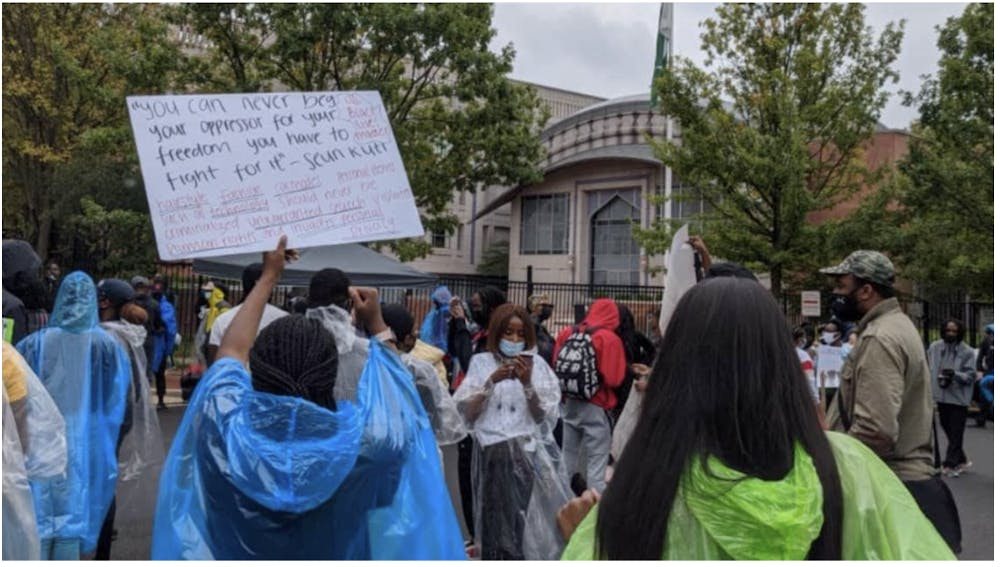Thousands of young activists in the Washington, D.C. area rallied to support Nigerian efforts to eliminate that country’s Special Anti-Robbery Squad, also known as SARS, a notoriously corrupt and brutal police force.
Demonstrations began on Oct. 9, 2020, at the Nigerian embassy, in an effort to end SARS. #EndSARS is a youth-facilitated, global, decentralized social movement that wants to end police brutality in Nigeria.
In June, Amnesty International released a report documenting over 82 cases of torture, mistreatment, and executions targeting youth on the streets, outside of Nigeria’s judicial system. The Nigerian government’s failure to address the problem demonstrated “an absolute disregard for international human rights laws and standards,” the report said.
The Nigerian police squad was created in 1984 in an effort to counter crimes in the nation, from robberies to kidnappings and carjackings.
The movement to #EndSARS is centered in the Lekki district of Lagos, the largest city in Africa where at least 38 protesters were killed in Nigeria on Oct. 20, according to Amnesty International.
This is in addition to the 82 plus cases of torture, ill-treatment, and execution infiltrated by SARS between January 2017 and May 2020. SARS was put in place to protect the youth but has proved to do everything but.
“Something people thought was in good faith has turned into legal massacres,” said Seun Babalola, the leader of the #EndSARS DMV movement. “When you fuse corruption and destruction, automatically you will have things like SARS getting out of hand.”
Fuel was added to the fire on Oct. 20 when Nigerian soldiers opened fire on END SARS demonstrators in Nigeria who had been participating in largely peaceful protests up to that point. Thirty-eight protestors were killed, according to Amnesty International.
Babajide Sanwo-Olu, the governor of Lagos state, along with the military denied all allegations of the horrific massacre in Lekki. All despite the several videos and eyewitness accounts from Nigerian youth, including an Instagram live stream.
The #EndSars movement here in the states has rooted itself in every major city in the country, in addition to the rest of the world. The DMV’s is one of the largest and loudest in unison with New York City, both home to large Nigerian-American populations. The D.C, Maryland, Virginia area is home to 19,600 Nigerians, while 36,000 reside in New York City.
With the majority of the protesters around the world ranging from ages 18-24, the youth are leading this movement. Here in the DMV, thousands of protesters have organized to put an end to SARS.
“We’re looking for amplification and global recognition,” stated Babalola. The movement has been recognized globally, with prominent figures like Nicki Minaj speaking out about the movement and U.S. Presidential candidate Joe Biden urging the Nigerian government to end the “violent crackdown on protesters.”
Protesters organized outside of the Nigerian Ambassador Sylvanius Adiewere Nsofor’s home in Maryland, on Oct. 20. In a video at the protest, you can hear someone exclaim, “My son is never coming back. My son is dead."
While the monumental movement has been recognized on a global scale, there has been little movement in the Nigerian government’s policies. “No prosecution yet,” stated Sally Sulieman, a humanitarian and Nigerian businesswoman. “No compensation yet. We can ignore EndSARS but the truth is nothing has changed.”
On Oct. 26, in an interview with CNN, Governor Sanwo-Olu admitted that the attacks on protesters were carried out by the Nigerian government and military. Still, civil unrest ensues.
Now, Nigerian lawmakers are threatening to introduce a social media bill. This bill would flag all videos of demonstrations as “hate speech.” On top of that, any person who is accused of posting such videos would be sentenced to jail time.
Babalola said that he has been a target of profiling and suspicious behavior since the protests have unraveled. In regards to his safety, he was forced to take to social media to state that he would never “willingly commit harm” to himself, a warning sign to let his followers know that he would not inflict self-harm if something happens to him.
“A lot of people in America are trying to stay strong for Nigerians, and not live in fear,” Babalola said. He expressed that he does not fear the police here or in Nigeria.



